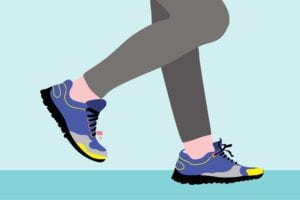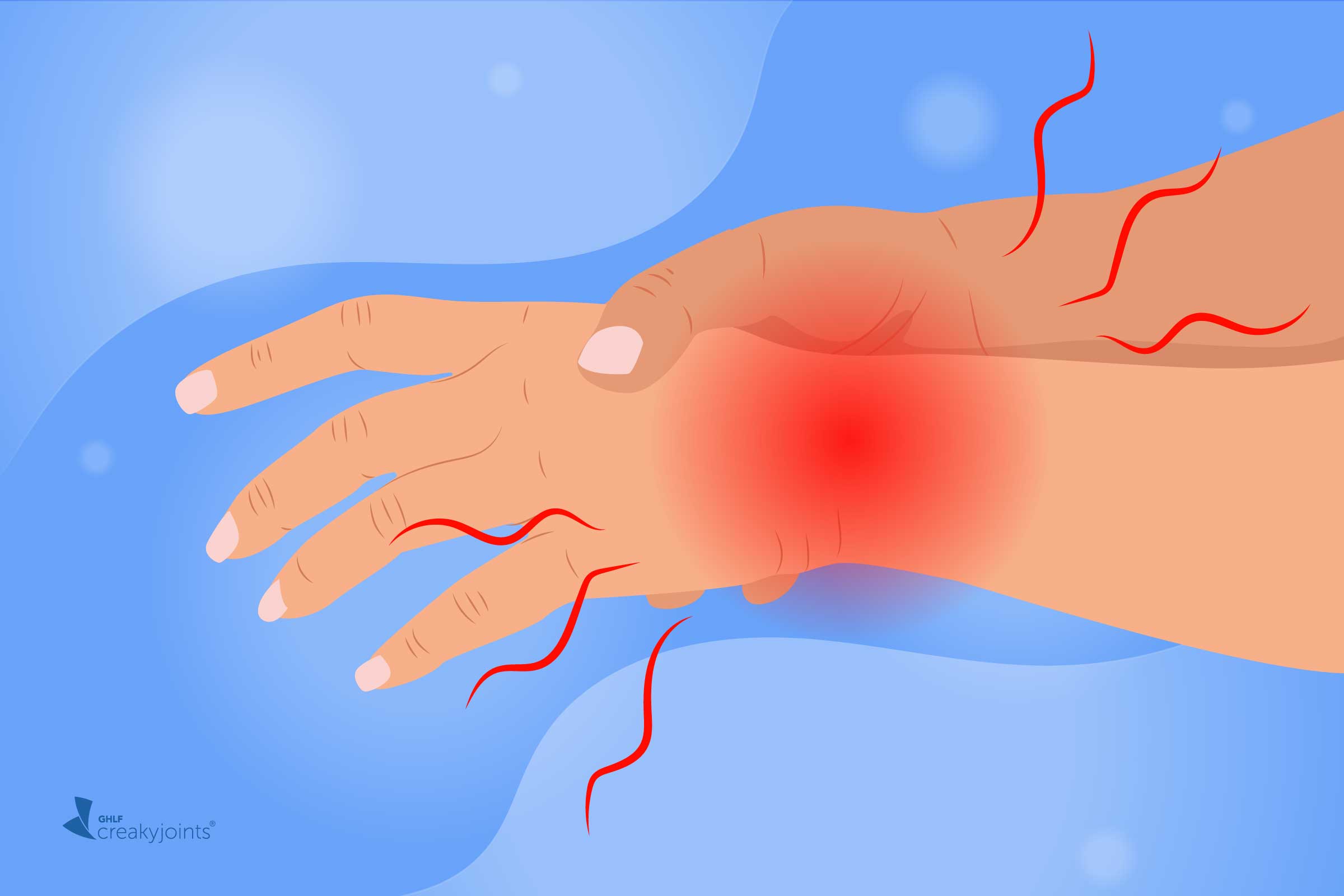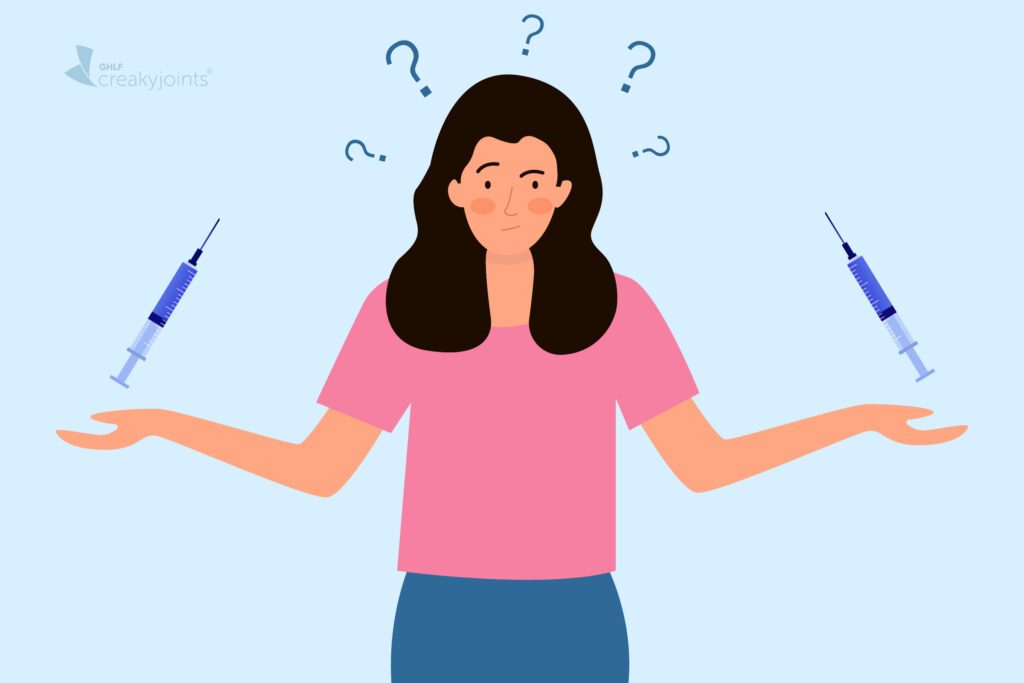

Fatigue is one of the most challenging symptoms of chronic illness to cope with. This is something we hear from CreakyJoints members over and over and over again.
“My worst problem is fatigue. I need all my energy just to get through my eight hours of work and when that’s over I have none left to do anything else,” Elena K. told us recently on Facebook.
“Fatigue is robbing me of the energy I wanted to use on all the projects I had planned for retirement,” shared Beverly K. on Facebook.
What Is Fatigue vs. Being Tired?
“Fatigue is a symptom you need to pay attention to because it is a red flag for so many underlying diseases. It’s often the driving symptom that leads patients to come in and eventually get diagnosed,” says Aly Cohen, MD, a rheumatologist at Integrative Rheumatology Associates in Princeton, New Jersey, and founder of The Smart Human. “Patients will tell me, ‘I’m just tired all the time’ and shrug it off but it’s not normal and there are ways to treat fatigue.”
First things first: How do you know if you have ordinary “I’m exhausted after a long day of work” tiredness or if it’s actual clinical fatigue?
“Medically speaking, fatigue is characterized by a feeling of weakness and a chronic lack of energy,” says Stuart Kaplan, MD, a rheumatologist with Rheumatology Consultants, LLP, and chief of rheumatology at South Nassau Communities Hospital in Oceanside, New York. Sound kinda vague? Because tiredness is a subjective feeling, your doctor should ask you more questions and you should be as detailed as possible about how your exhaustion symptoms are affecting your life, he says. Questions about your fatigue may include:
- Do you wake up tired even after a full night’s sleep?
- Do you find it difficult to muster energy for activities you enjoy and are excited about?
- Do you forego important daily activities, like showering or work, because you’re just too exhausted to do them?
- Do you sleep more than seven to eight hours a night (and still wake up tired)?
- Has the exhaustion lasted more than a week?

What Causes Fatigue in Chronic Illness
Pain
First, simply dealing with chronic pain is exhausting, Dr. Kaplan says. Pain also makes it hard to sleep and difficult to rest, which contributes to fatigue. Finding ways to better manage your pain levels can help manage fatigue as well.
Inflammation
The inflammation that is at the root of diseases like rheumatoid arthritis and lupus is directly related to fatigue, Dr. Kaplan says. “That inflammation takes a real toll on your body and wears it down,” he explains. “One of the best ways to deal with your fatigue is to do everything you can to manage the underlying inflammation.” This means following your treatment plan, taking your medications, avoiding triggers as best as you can, and making time for adequate rest.
Multiple health problems
Having multiple health conditions at the same time may gang up and make your fatigue worse. For example, anemia is common in people with rheumatoid arthritis and other inflammatory diseases. Fibromyalgia is another syndrome that can occur on its own but can also strike alongside other kinds arthritis or chronic pain. It’s important to share your fatigue symptoms with your doctor because they doctor may recommend more tests to pinpoint other possible causes of the fatigue, Dr. Cohen says.
Medication side effects
Some of the medications used to treat arthritis and other chronic illnesses can cause or worsen fatigue, Dr. Kaplan says. Common drugs that may make you feel tired include muscle relaxants, methotrexate, some blood pressure medications, and painkillers, he says. Some patients report feeling fatigue after biologic injections or infusions as well. While fatigue may not warrant a change in your medications, it’s definitely worth talking to your doctor about so you can find ways to mitigate fatigue as a potential side effect, he adds.
How to Cope with Fatigue
Managing fatigue requires a well-rounded approach. This may entail changes to your medication regimen, trying supplements in addition to your medication, managing stress and mental health, and making other healthy lifestyle changes.
We asked doctors and chronic illness patients for their best tips on coping with chronic fatigue and exhaustion.
Change Your Medication Regimen
1. Consider injections instead of pills
Sometimes the same drug can affect you in different ways depending on the method in which it is administered, Dr. Cohen says. “Take methotrexate, for instance — with pills you may have to use more medication to get the therapeutic dose because it has to pass through the entire gastrointestinal tract,” she explains. “Using an intramuscular injection often allows us to use less medication as it goes directly to your bloodstream. This may help lessen side effects such as fatigue for some patients.” Read more common questions about methotrexate.
2. Schedule injections for weekends
“My injections for my rheumatoid arthritis really kick my butt, like I can’t get out of bed unless it’s to go to the bathroom,” says Genevieve L., 30, of Melbourne, Australia. Thankfully the exhaustion is the worst on the first day and improves each day after. “I’ve learned to just schedule my injections for Fridays after work so I can sleep it off on Saturday,” she says.
3. Split up doses
Another potential way to handle medication-related fatigue is to split up your doses and take them at different times to help minimize side effects, says Dr. Cohen. Talk to your doctor before trying this as some medications must be taken exactly as prescribed. You should never change your dosing schedule without first discussing it with your health care provider.
4. Ask about timing around morning vs. evening
“I’m on prednisone for my psoriatic arthritis and I found that it was making it really hard to sleep at night,” says Melanie S., 21, of Phoenix, Arizona. “Then my pharmacist told me it’s kind of a stimulant so I should take it in the morning.” Now she takes it with breakfast and says this has helped a lot with her exhaustion.
Protect Your Mental Health
5. See a psychiatrist or therapist
If symptoms of chronic fatigue sound similar to symptoms of depression that’s because there’s often a lot of crossover between the two. Experiencing fatigue can make you feel depressed and feeling depressed can promote feelings of fatigue, which creates a vicious cycle, Dr. Cohen says. “Getting treated for depression and/or anxiety can make a big difference in how well you can cope with fatigue,” she says. A psychiatrist, preferably one who specializes in chronic diseases, can help you get the right diagnosis and treatment for mental health issues, especially when medication is necessary.
6. Use the ‘spoon theory’ when talking to loved ones
“One of the hardest things is getting my husband to understand what I mean when I say I’m tired,” Genevieve says. “I’m not normal tired, I’m exhausted to the bone.” One thing that’s helped her explain her exhaustion and pain to others is using an analogy called the spoon theory.
The basic premise: You have a “spoonful” of energy available for each task you need to get done each day. Every time you do something, you remove a spoon. People with chronic illnesses start each day with fewer, smaller spoons than healthy people, and everyday tasks require more spoons when you have chronic illness than when you don’t. You can run out of spoons — and energy — much more quickly than those around you.
7. Don’t overdo it on good days
On days when your illness is bad, it can feel impossible to do the simplest tasks. So when you feel better, it’s tempting to try and cram in all those things you didn’t get done.
“Although the docs tell you not to overdo it on good days, I can’t help it. I have so many bad days and I’m so far behind,” Elizabeth F. told us on Facebook. “Last Saturday was a good day. I vacuumed and mopped the whole house, cleaned two bathrooms, did all of the laundry, went grocery shopping at 9 PM, and cleaned out the closet to get a bag together for donation. Then on Sunday the pain was 225 on a scale of 1-10.” She feels pressure to get things done when she’s feeling well because of that “what-if” feeling that the pain could get worse.
Not overdoing it on good days is a hard habit to adopt, but you have to try. Even though you may be feeling better, your body is still working hard because of your disease and your energy is in short supply. Overdoing it will only make your fatigue worse in the future, he says.
8. Know your limits and be firm with others
“I’ve learned that two hours of activity, like going out with friends or taking my kids to the pool, is the max my body can handle before I crash hard,” says Janelle W., 42, of Ann Arbor, Michigan, who has lupus. “And once the fatigue hits I can’t do anything for the rest of the day.” To avoid these crashes, Janelle says she’s learned that she has to be strict about her two-hour limit, both with herself and others. “It’s a running joke with my family that I’m the party pooper but I’d rather be that than totally pooped for days after,” she says.

Consider Supplements
9. Try CBD
CBD, or cannabidiol, comes from the marijuana plant but it isn’t pot so it won’t get you high. It may, however, help manage many symptoms that come along with chronic illnesses. “Honestly CBD has made the biggest difference in treating my fibromyalgia, more than any prescription meds I’ve tried,” says Jennifer L., 29, of Boulder, Colorado. “I’m still tired but I feel less of that crushing exhaustion, plus it really helps reduce my pain. When I have less pain I have more energy,” she explains. She uses an oral tincture on days when she’s feeling the most symptomatic. Some CBD products may contain THC, which is the marijuana chemical that’s responsible for making you high. Read labels carefully to make sure you know what you’re getting. Note: CBD products may or may not be legal depending on where you live, so check local laws first.
10. Take probiotics
“Your gut microbiome — the bacteria that live in your digestive tract — plays a big role in your immune system and can affect your fatigue and energy levels,” Dr. Cohen says. For this reason, she recommends patients with autoimmune disorders take a high-quality probiotic supplement to increase the healthy bacteria in their gut. She recommends looking for recognized brands that contain a diverse variety of bacterial strains. It’s also a good idea to eat probiotic foods like yogurt, sauerkraut, kefir, and kimchi. But be careful to not eat yogurt with a ton of sugar, which promotes inflammation.
11. Boost your vitamin D intake
Many people are deficient in vitamin D, a nutrient that is vital for a healthy immune system and may play a role in energy and fatigue. Your body can produce its own vitamin D when exposed to sunshine and you can get some vitamin D from your diet, such as from fish and fortified milk, but if your vitamin D levels are very low you may need to take a vitamin D supplement. You can talk to your doctor about whether you should get a blood test to check your vitamin D levels.
12. Try melatonin
Melatonin is a hormone that helps regulate sleep-wake cycles. Some research suggests melatonin supplements can help with insomnia and other sleep issues. “When I said I felt chronically tired but couldn’t fall asleep at night my nurse practitioner suggested melatonin and I feel like it’s made a difference,” says Andrea P., 27, of Gig Harbor, Washington, who has fibromyalgia.

Live a Healthy Lifestyle
13. Exercise every day
Exercise is tricky for people with pain and fatigue. Who wants to lace up sneakers when you can barely get out of bed? It’s about striking a balance. A little bit of physical activity, every day, is one of the best things you can do to combat fatigue and increase your energy, Dr. Kaplan says. But too much can exacerbate joint pain and leave you lying on the couch for the rest of the day. Find your happy medium by listening to your body and stopping when you start to feel tired, he says. He recommends low-impact exercises like walking, swimming, and biking, along with range-of-motion exercises to build muscle and keep your joints flexible.
14. Practice good sleep hygiene
If you’re not sleeping well, it’s a given that you’re going to feel fatigue. People with autoimmune or inflammatory diseases have to work even harder to get good rest, so you have to make quality sleep one of your top priorities, Dr. Cohen says. We could write a whole article on sleep tips for people with arthritis (oh, wait, we did!) but the short version: make sure your room is dark, cool, comfortable, and quiet. Dr. Cohen also suggests you keep your bedroom solely for low-stress activities, move electronics out of the room, and get evaluated for sleep problems if you snore or have insomnia.
15. Keep a blanket and pillow in your office
“Rheumatoid arthritis and fatigue go hand in hand for me,” says Marco S., 37, of Mission Viejo, California. “When it’s at its worst all I want to do is sleep but, you know, I have a job.” His solution? “I keep a small pillow and blanket under my desk so if I have some downtime I can shut my door and take a nap.”
16. Ditch the Diet Coke
Caffeine may pep you up in the short term but it can contribute to chronic fatigue in the long run. Plus, artificial sweeteners in diet drinks may disrupt the balance of your gut bacteria and play a role in fatigue, Dr. Cohen says. It’s best to stick to filtered water, herbal teas, and other natural drinks to quench your thirst, she says. If you need a little sweetness, go for a small drizzle of real honey — not only is it tasty but has some proven health benefits as well.
17. Ask about flexible work arrangements
On days when the fatigue overwhelms Marco, he has the option of working from home. It’s not an option for everyone but if you think your job might allows it, it’s worth asking about it, he says. “My boss is pretty understanding and I try to limit it to days when the flare-ups are really bad,” he explains. “My last boss would never have let me do it though, so it really is about your office culture.” Here are more tips for navigating work with chronic illness.
18. Eat an anti-inflammatory diet
Inflammation is an underlying problem in inflammatory types of arthritis and what you eat may help manage it, Dr. Cohen says. Reduce or eliminate processed foods, sugary sweets, salty snacks, and fast food. Eat more fruits, vegetables, legumes, and clean proteins. Read about more anti-inflammatory foods nutritionists want you to eat.
19. Take advantage of shopping technology
These days, you barely to set foot out of your house to fill your fridge — a huge perk on days where fatigue hits you hard. “I order groceries online from Walmart and Costco. Even vendors at the local farmer’s market will make home deliveries,” Janelle says. Some apps will even save your grocery lists and help you clip online coupons, saving you time and money.
20. Take breaks from your phone
Technology can be a catch-22 when it comes to resting. Playing Candy Crush, watching Netflix, or surfing the web may feel like a good way to wind down but it’s not real rest and may even make you more anxious. In addition, the blue light emitted from phone, tablet, and laptop screens can also mess up your sleep. “Don’t use screens within an hour of bedtime,” Dr. Cohen cautions.





